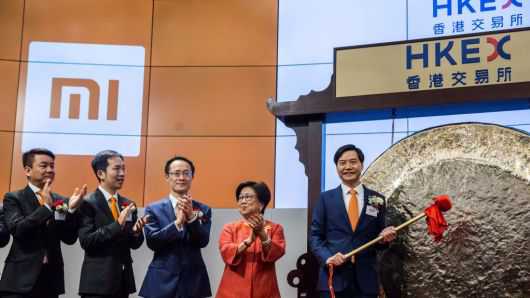Dual-class shares are a threat to Asian market fairness, watchdog warns
06 December, 2018

Xiaomi founder, chairman and CEO Lei Jun hits a gong at the company's initial public offering launch on the Hong Kong Stock Exchange on July 9, 2018.
Two decades of progress on corporate governance in Asian markets and companies is coming under threat by increasingly "localist" thinking, a watchdog group warned Wednesday.
The Asian Corporate Governance Association (ACGA) cited the introduction in Hong Kong and Singapore of dual-class shares — and concerns that the idea is spreading — as an example of local markets turning away from the principle of shareholder fairness.
"The strong commitment to quality and better practices of the past 20 years is starting to become undermined by a more localist and divisive way of thinking," the Hong Kong-based ACGA said in its 2018 report on corporate governance, released in conjunction with financial company CLSA.
Jamie Allen, ACGA secretary general, said that principles of transparency, accountability and fairness have underpinned steady progress.
"Our feeling now, with the introduction of dual-class shares in particular, is the issue of fairness is being undermined in certain markets, particularly Hong Kong and Singapore," he told reporters in Hong Kong at the release of the report, which comes out every two years.
Dual-class shares allow for weighted voting rights and give company founders and insiders more control. The New York Stock Exchange and Nasdaq in the United States allow the practice and companies such as Facebook and Google have them. The idea has spread to Asia as exchanges battle for competitive initial public offerings.
Hong Kong and Singapore introduced the concept this year. Two Chinese companies — smartphone maker Xiaomi and food delivery app Meituan Dianping — listed in Hong Kong with weighted voting rights. There have been none in Singapore yet.
Despite the paucity so far, Allen expressed concern of "contagion" as the idea spreads, citing it being under consideration in South Korea and seen as potentially attractive in China.
"It creates this very unfair system," Allen told CNBC, adding dual-class shares essentially lock out a company's board of directors.
"People who have a minority of the shares totally control the company," he said. "And therefore that undermines the role of other shareholders."
Stock market operator Hong Kong Exchanges and Clearing said in an email to CNBC in response to the ACGA report that it changed its listing rules to "enhance Hong Kong's competitiveness as a global financial center."
It added that weighted voting rights "include additional investor safeguards such as restrictions on post-listing share transfers and a 'natural sunset' clause for shares listed under the rules."
A spokeswoman for the Singapore Exchange said she had not seen the ACGA report, so would not be able to comment.
However, that exchange said in a June release announcing its rules for dual-class shares that it was joining "global exchanges in Canada, Europe and the U.S." in doing so and implemented safeguards to counter associated risks, including one vote for all shares for certain actions, such as when appointing and removing independent directors.
'Potential to outrank'
Australia remained on top of the ACGA report's market ranking in 2018, praised for its strong company scores the report said "stand head and shoulders above the region."
Hong Kong and Singapore came in second and third, respectively, with Hong Kong rising a notch and Singapore falling one.
The report said that despite losing points over the dual-class share introduction, both have strengths, such as regulatory enforcement in Hong Kong and sound listed company financial reporting in Singapore.
But Malaysia and Taiwan, which came in fourth and fifth, are close on their heels.
"The message is if Hong Kong and Singapore don't make any further improvements in their corporate governance (and) if Malaysia and Taiwan keep improving, then they do have the potential to outrank them next time," Allen told reporters.
Malaysia made the biggest jump, rising from seventh place in 2016.
The report credited the country's change of government after the 1MDB sovereign wealth fund scandal as creating a "strong focus on anti-corruption" and improved corporate governance, such as a new companies act and revisions to its corporate governance code.
Japan recorded the biggest fall, to seventh from fourth. It was brought down, the report said, by weak corporate governance rules and shareholder rights.
TAG(s):
